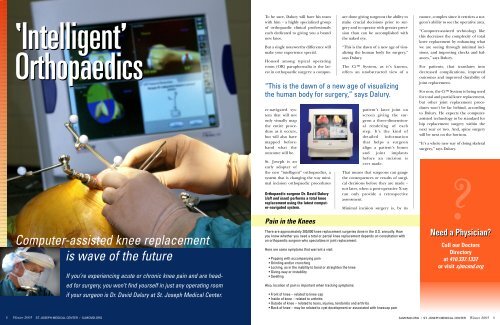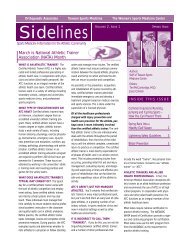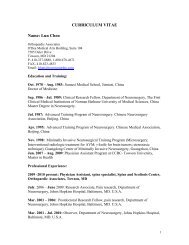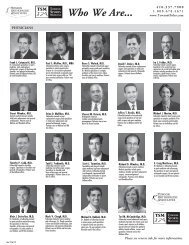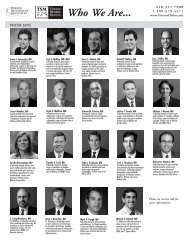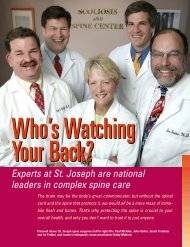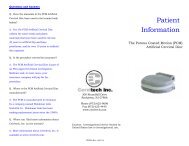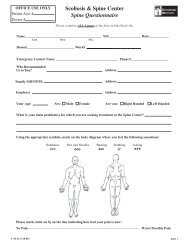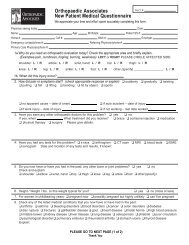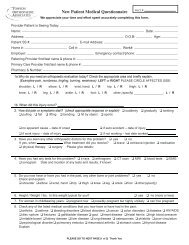Intelligent Orthopaedics - Towson Orthopaedic Associates
Intelligent Orthopaedics - Towson Orthopaedic Associates
Intelligent Orthopaedics - Towson Orthopaedic Associates
Create successful ePaper yourself
Turn your PDF publications into a flip-book with our unique Google optimized e-Paper software.
‘<strong>Intelligent</strong>’<br />
<strong><strong>Orthopaedic</strong>s</strong><br />
Computer-assisted knee replacement<br />
is wave of the future<br />
If you’re experiencing acute or chronic knee pain and are headed<br />
for surgery, you won’t find yourself in just any operating room<br />
if your surgeon is Dr. David Dalury at St. Joseph Medical Center.<br />
To be sure, Dalury will have his team<br />
with him – a highly specialized group<br />
of orthopaedic clinical professionals<br />
each dedicated to giving you a brand<br />
new knee.<br />
But a single noteworthy difference will<br />
make your experience special.<br />
Housed among typical operating<br />
room (OR) paraphernalia is the latest<br />
in orthopaedic surgery: a computer-navigated<br />
system<br />
that will not<br />
only visually map<br />
the entire procedure<br />
as it occurs,<br />
but will also have<br />
mapped beforehand<br />
what the<br />
outcome will be.<br />
St. Joseph is an<br />
early adopter of<br />
the new “intelligent” orthopaedics, a<br />
system that is changing the way minimal<br />
incision orthopaedic procedures<br />
Pain in the Knees<br />
There are approximately 200,000 knee replacement surgeries done in the U.S. annually. How<br />
you know whether you need a total or partial knee replacement depends on consultation with<br />
an orthopaedic surgeon who specializes in joint replacement.<br />
Here are some symptoms that warrant a visit:<br />
• Popping with accompanying pain<br />
• Grinding and/or crunching<br />
• Locking, as in the inability to bend or straighten the knee<br />
• Giving-way or instability<br />
• Swelling<br />
Also, location of pain is important when tracking symptoms:<br />
are done giving surgeons the ability to<br />
make crucial decisions prior to surgery<br />
and to operate with greater precision<br />
than can be accomplished with<br />
the naked eye.<br />
“This is the dawn of a new age of visualizing<br />
the human body for surgery,”<br />
says Dalury.<br />
The Ci System, as it’s known,<br />
offers an unobstructed view of a<br />
“This is the dawn of a new age of visualizing<br />
the human body for surgery,” says Dalury.<br />
<strong>Orthopaedic</strong> surgeon Dr. David Dalury<br />
(left and inset) performs a total knee<br />
replacement using the latest computer-navigated<br />
system.<br />
patient’s knee joint on<br />
screen giving the surgeon<br />
a three-dimensional<br />
rendering of each<br />
step. It’s the kind of<br />
detailed information<br />
that helps a surgeon<br />
align a patient’s bones<br />
and joint implants<br />
before an incision is<br />
ever made.<br />
That means that surgeons can gauge<br />
the consequences or results of surgical<br />
decisions before they are made –<br />
not later, when a post-operative X-ray<br />
can only provide a retrospective<br />
assessment.<br />
Minimal incision surgery is, by its<br />
• Front of knee – related to knee cap<br />
• Inside of knee – related to arthritis<br />
• Outside of knee – related to tears, injuries, tendonitis and arthritis<br />
• Back of knee – may be related to cyst development or associated with kneecap pain<br />
nature, complex since it restricts a surgeon’s<br />
ability to see the operative area.<br />
“Computer-assisted technology like<br />
this decreases the complexity of total<br />
knee replacement by enhancing what<br />
we are seeing through minimal incisions,<br />
and improving checks and balances,”<br />
says Dalury.<br />
For patients, that translates into<br />
decreased complications, improved<br />
outcomes and improved durability of<br />
joint replacement.<br />
For now, the Ci System is being used<br />
for total and partial knee replacement,<br />
but other joint replacement procedures<br />
won’t be far behind, according<br />
to Dalury. He expects the computerassisted<br />
technology to be standard for<br />
hip replacement surgery within the<br />
next year or two. And, spine surgery<br />
will be next on the horizon.<br />
“It’s a whole new way of doing skeletal<br />
surgery,” says Dalury.<br />
?<br />
Need a Physician?<br />
Call our Doctors<br />
Directory<br />
at 410.337.1337<br />
or visit sjmcmd.org<br />
8 Winter 2005 ST. JOSEPH MEDICAL CENTER / SJMCMD.ORG<br />
SJMCMD.ORG / ST. JOSEPH MEDICAL CENTER Winter 2005 9
Stressed Out<br />
Overcoming<br />
the Urge<br />
Stress incontinence is what sent<br />
64-year-old Bonne Morrison to<br />
St. Joseph chief of Urology Dr.<br />
Marc Siegelbaum.<br />
“It became embarrassing,”<br />
explains Morrison. More problematic<br />
for her was that she began<br />
giving up her daily gym workouts,<br />
which were a significant part of<br />
her life.<br />
“When I started leaking when<br />
working out, that’s when incontinence<br />
became a huge issue for<br />
me,” she says. “And, I wasn’t<br />
going to take it.”<br />
Fortunately for Morrison, surgical<br />
treatments for incontinence have<br />
never been faster or easier. The<br />
most common are “sling” procedures<br />
such as the pubovaginal or<br />
pubourethral sling. In the past,<br />
these slings were created from<br />
grafts from another part of the<br />
body and anchored with devices<br />
that essentially altered the position<br />
of the urethra.<br />
Considered minimally invasive,<br />
advances in the past decade<br />
have made these procedures<br />
even less invasive, says<br />
Siegelbaum. Today, the transvaginal<br />
tape (TVT) sling – the next<br />
generation of sling procedures –<br />
is widely used and appreciated<br />
among surgeons and their<br />
patients for its anatomicallyfriendly<br />
approach.<br />
“The TVT uses a mesh material<br />
instead of anchors and grafts,”<br />
says Siegelbaum. “It’s a 20-minute<br />
quick-recovery procedure that can<br />
be done as an inpatient or outpatient,<br />
and increases the level of<br />
patient comfort.”<br />
The newest, minimally<br />
invasive “sling” procedure<br />
has made urinary incontinence<br />
a thing of the past for<br />
Bonne Morrison.<br />
Morrison says she felt no pain.<br />
“Dr. Siegelbaum was perfection,<br />
and I was so elated when<br />
he said ‘yes, we can fix this,’”<br />
she adds.<br />
Morrison now advocates the<br />
surgery to many of her friends.<br />
“I’ve become aware of so many<br />
women who didn’t know this<br />
procedure was available,” she<br />
explains. “Some of them have<br />
been living with this type of<br />
incontinence for as long as<br />
20 years – they thought it<br />
was normal.”<br />
Learn More!<br />
Urinary incontinence affects 15-20<br />
million people in the U.S. – women<br />
twice as often as men. Join<br />
St. Joseph at a free lecture to<br />
learn more about prevention,<br />
diagnosis and treatment of this<br />
common condition. Wednesday,<br />
March 16, 7 to 8 p.m.<br />
Call 410.337.1479 to register.<br />
Female incontinence common,<br />
but treatable<br />
Most of us have seen the “gotta go right now” commercials<br />
that slightly poke fun at the issue of incontinence.<br />
It’s good that it puts it out there, says Dr. Marc Siegelbaum, chief of Urology<br />
at St. Joseph Medical Center. “But for a lot of people, particularly women,<br />
it’s no laughing matter.”<br />
Urinary incontinence (UI) affects about 15-20 million people in the U.S. –<br />
women are affected twice as often as men. The prevalence of incontinence<br />
increases with age. Up to 30 percent of adults over age 60 have some form<br />
of UI. But, says Siegelbaum, “it’s not a<br />
condition that should be considered a<br />
normal part of aging.”<br />
There are reasons, though, why<br />
women experience incontinence<br />
more frequently than men. Pregnancy<br />
and childbirth, menopause and the<br />
structure of the female urinary tract<br />
account for most of the difference.<br />
The two most common types of UI are<br />
stress and urge incontinence. If a<br />
cough, laugh or sneeze, or any movement<br />
that puts pressure on the bladder,<br />
causes you to leak urine, you may<br />
have stress incontinence.<br />
“We see a lot of stress incontinence<br />
in women,” say Siegelbaum. “This is<br />
the type of UI usually brought about<br />
by the physical changes associated<br />
with pregnancy, childbirth and<br />
menopause.”<br />
If you leak urine for no apparent reason,<br />
however, with a sudden need or<br />
“urge” to urinate, it’s more likely that<br />
you might have urge incontinence.<br />
“The most likely reason for urge<br />
incontinence is inappropriate bladder<br />
contractions,” says Siegelbaum.<br />
“This means that your bladder might<br />
involuntarily empty during sleep,<br />
after drinking a small amount of<br />
water – even when you touch water or<br />
hear it running.”<br />
Sometimes, the bladder receives an<br />
inappropriate signal from the brain<br />
to empty, or the bladder muscle spontaneously<br />
contracts. This is referred<br />
to as spastic or overactive bladder.<br />
The good news is that there are treatments<br />
for incontinence, which range<br />
from simple strengthening exercises<br />
to surgery, says Siegelbaum.<br />
“The first step is an evaluation by a<br />
physician who specializes in the urinary<br />
tract,” he says. This will include<br />
questions about symptoms and medical<br />
history, physical exam and a test<br />
that measures bladder capacity. Other<br />
tests such as urinalysis, ultrasound and<br />
cystoscopy may be performed as well.<br />
“Once we identify the type of incontinence,<br />
then we can begin looking at<br />
treatments,” says Siegelbaum.<br />
For women with spastic bladders or<br />
urge incontinence, simple or more<br />
sophisticated bladder exercises such as<br />
biofeedback training may help.<br />
Numerous oral or topical patch medications<br />
are available. For more resistant<br />
cases, implantable neurostimulators<br />
also can be used.<br />
For stress incontinence, treatments<br />
include bladder-control exercises, urethral<br />
injections with bulking materials,<br />
or minimally invasive sling procedures.<br />
“There are many options for helping<br />
folks with UI,” says Siegelbaum.<br />
“Women should not be so embarrassed<br />
by this condition that they<br />
don’t seek treatment.”<br />
10 Winter 2005 ST. JOSEPH MEDICAL CENTER / SJMCMD.ORG<br />
SJMCMD.ORG / ST. JOSEPH MEDICAL CENTER Winter 2005 11
CLOSE UP<br />
CLOSE UP<br />
When Band Aids Won’t Do<br />
Wound Center offers help for non-healing wounds<br />
Checking Up<br />
Regular physicals are best path to good health<br />
St. Joseph’s Wound Center was a<br />
turning point for Dolores Medin-Knitz.<br />
When it comes to wounds,<br />
most of us think of cuts or<br />
abrasions for which a swift<br />
wipe with an antiseptic and<br />
a Band Aid to top it off are<br />
the rule of thumb.<br />
And, when the body’s natural healing<br />
abilities are in order, that’s usually<br />
the case.<br />
But, as people grow older and suffer<br />
from circulatory problems or diabetes,<br />
or require surgery or bed rest, a<br />
small wound can turn into a very large<br />
healing problem.<br />
Need a Physician?<br />
Call our Doctors<br />
Directory at<br />
410.337.1337 or<br />
visit sjmcmd.org<br />
“Sometimes an ordinary incident like<br />
bumping into a piece of furniture<br />
can become a non-healing wound,”<br />
explains Sue Currence, R.N., clinical<br />
manager of the Wound Center at<br />
St. Joseph Medical Center.<br />
More than four million older people<br />
in the U.S. suffer from non-healing<br />
wounds each year, according to<br />
the National Institutes of Health.<br />
Wounds range from pressure ulcers,<br />
to surgical incisions that have become<br />
infected, to leg ulcers due to poor<br />
blood circulation.<br />
For 74-year-old Dolores Medin-Knitz,<br />
the culprit was a form of dermatitis on<br />
her buttocks caused by celiac disease,<br />
a gastrointestinal disorder.<br />
“It was just a mess,” she explained. “I<br />
was in constant pain – unable to walk,<br />
stand or sit – and the advice I got was<br />
to have plastic surgery.”<br />
Medin-Knitz was vehemently opposed<br />
to having surgery, but at wits end for<br />
finding a solution to her problem.<br />
“I was very depressed,” she recalls.<br />
Wounded Knee<br />
and Others<br />
Non-healing wounds are more common<br />
than people think. Here are some<br />
typical causes:<br />
• People who stand on their feet or sit<br />
in place for most of their careers are<br />
at risk for leg ulcers<br />
• Wounds caused by diabetes<br />
• Being overweight, which puts excess<br />
pressure on ankle valves<br />
• Fragile skin such as occurs with<br />
steroid therapy<br />
• Dermatitis<br />
Eventually, she found her way to<br />
St. Joseph’s Wound Center through<br />
the advice of a friend. Now, Medin-<br />
Knitz credits her turning point to<br />
Currence and the treatment she<br />
received from the Wound Center.<br />
Currence, in turn, attributes the center’s<br />
success in healing to treating the<br />
“whole” patient. “We look at what is<br />
happening to the patient on a total<br />
level,” she explains.<br />
The Wound Center staff also has an<br />
extensive knowledge of and access to<br />
the most advanced wound care technology<br />
available, whether dressings,<br />
equipment or physical therapy.<br />
“Everything has been so positive for<br />
me,” says Medin-Knitz. “They were the<br />
only ones to offer the encouragement<br />
I needed.”<br />
Need a<br />
Physician?<br />
Call our<br />
Doctors<br />
Directory at<br />
410.337.1337<br />
or visit<br />
sjmcmd.org<br />
To go, or not to go? That’s<br />
the question many adults<br />
ask themselves when it<br />
comes to getting regular<br />
physical checkups.<br />
But, the American Medical Association<br />
and the President’s Health and Fitness<br />
Initiative encourage routine checkups<br />
and screenings to catch previously<br />
undiagnosed conditions or risks<br />
of conditions.<br />
“Age 50 is a milestone for regular checkups<br />
and screenings, with an emphasis<br />
on preventive medicine,” says St. Joseph<br />
Medical Center primary care physician<br />
Dr. Mark Saba. “We figure out what we<br />
can detect early and even head off diseases,<br />
like diabetes, before they begin.”<br />
For some people, routine screenings<br />
like mammograms and prostate exams,<br />
should begin at age 40, and even earlier.<br />
Patients have different screening<br />
needs, according to Saba, and doctors<br />
can determine those needs based on<br />
comprehensive evaluations.<br />
“My job is to tell patients what the<br />
prevalence of certain diseases is and<br />
what each individual is at risk for<br />
down the road; conditions such as a<br />
heart attack or stroke.” Saba takes<br />
into consideration family history and<br />
advocates early base-line screenings.<br />
Are You Checking Up?<br />
Don’t ignore guidelines for preventing<br />
the common conditions below. A primary<br />
care physician can help keep you<br />
on track. If you have a family history of<br />
any of the below, you should see a<br />
physician earlier than these age guidelines,<br />
says Saba.<br />
Blood pressure: Every 2 years for all ages<br />
Cholesterol: Every 5 years until age 40,<br />
then check with your doctor<br />
Colon and rectal cancer: Screenings<br />
annually, age 50 and older<br />
Prostate cancer: PSA and rectal exam<br />
annually, age 50 and older, 45 for<br />
African-American men.<br />
Mammograms: Every 1 to 2 years, age<br />
40 and over<br />
Diabetes: Pre-diabetes screening of<br />
overweight people, age 40 and over<br />
One of the most valuable contributions<br />
Saba believes he can make to a<br />
person’s good health is diet, nutrition<br />
and exercise counseling. Many health<br />
issues are tied to excess weight.<br />
“More than anything else, I help with<br />
diet management with my patients,”<br />
says Saba.<br />
Saba works closely with his patients to<br />
determine goals and then acts as a<br />
guide for achieving and maintaining<br />
those goals.<br />
Successful lifestyle habits take perseverance<br />
combined with education, says<br />
Saba. “A lot of people enjoy checking<br />
back in with me at regular intervals, so we<br />
can adjust their regimen accordingly and<br />
make goals for follow-up appointments.”<br />
12 Winter 2005 ST. JOSEPH MEDICAL CENTER / SJMCMD.ORG<br />
SJMCMD.ORG / ST. JOSEPH MEDICAL CENTER Winter 2005 13
COMMUNITY & FAMILY PROGRAMS<br />
Preregistration or scheduled<br />
appointments are required<br />
for many calendar activities.<br />
Unless otherwise designated,<br />
call 410.337.1479 to register<br />
or schedule your<br />
appointment. All activities<br />
are held at St. Joseph<br />
Medical Center unless otherwise<br />
indicated.<br />
TOPICS OF INTEREST<br />
Yoga Classes<br />
Hatha Yoga, Senior Yoga, After<br />
Breast Cancer Diagnosis (ABCD)<br />
Yoga and Pregnancy Yoga<br />
Please call for times, prices,<br />
and registration.<br />
Breast Health, Breast<br />
Cancer, and Breast<br />
Self-Exam<br />
Breast cancer is the most common<br />
type of cancer among<br />
women in this country (other<br />
than skin cancer). Find out<br />
more about this disease and<br />
how prevention and early diagnosis<br />
can help. Lite fare provided.<br />
Registration required.<br />
Thursday, March 3, 6 p.m.<br />
SCREENINGS<br />
Breast Cancer Screening<br />
For women 40 years and older,<br />
who have not had a mammogram<br />
within the past year and<br />
do not have breast disease.<br />
This FREE screening includes a<br />
clinical breast exam and a<br />
screening mammogram.<br />
Appointment required.<br />
Saturday, April 2, 9 a.m. – 1 p.m.<br />
Skin Cancer Screening<br />
One person dies of melanoma skin<br />
cancer every hour. Protection,<br />
prevention, and detection are the<br />
key to healthy skin. See how<br />
healthy your skin is at this FREE<br />
screening. Appointment required.<br />
Wednesday, May 11, 5:00 p.m.<br />
– 7:30 p.m.<br />
Pancreatic Cancer:<br />
Knowledge to Tackle<br />
This Disease!<br />
Do you smoke or have diabetes?<br />
Are you male or African<br />
American? These are just<br />
some of the risk factors for<br />
Pancreatic Cancer, which is<br />
the 4th leading cause of all<br />
cancer deaths. Come learn<br />
about its causes, diagnosis,<br />
new treatments, and prevention<br />
for this disease.<br />
Tuesday, March 8, 7 p.m.<br />
Female Incontinence: Relief<br />
for Those Affected<br />
Incontinence affects about 15-<br />
20 million people in the U.S.<br />
and women are affected twice<br />
14 Winter 2005 ST. JOSEPH MEDICAL CENTER / SJMCMD.ORG<br />
Heart Risk Screening<br />
Saturday, February 19, 8 a.m. – Noon<br />
Call 410.337.4478 after February 1 to schedule<br />
appointment.<br />
Receive a free assessment of your modifiable cardiac<br />
risk factors including cholesterol (Total & HDL), body<br />
composition, blood pressure, exercise and smoking<br />
habits. Meet with a counselor who will review your<br />
results and provide recommendations for risk factor<br />
reduction and follow-up. Fasting not required.<br />
Participants must be at least 18 years of age.<br />
Atrial Fibrillation: Managing the Unmanageable<br />
Tuesday, February 8, 6:30 p.m.<br />
Understand the basics of atrial fibrillation, treatment<br />
options, and lifestyle challenges.<br />
Dinner provided. Registration required.<br />
Bone Density Screening<br />
for Osteoporosis<br />
Suitable for those with the risk<br />
factors of:<br />
• being female<br />
• thin and/or small frame<br />
• family history of osteoporosis<br />
• post-menopausal<br />
• inactive lifestyle<br />
• smoking<br />
• excessive use of alcohol<br />
• long-term steroid use<br />
Consists of quick, painless<br />
ultrasound test of the heel.<br />
For those who have not had<br />
a Dexascan or ultrasound<br />
bone scan in the past year.<br />
Fee $20.<br />
Appointment required.<br />
HEART MONTH<br />
as often as men. Incontinence<br />
is not a normal part of aging.<br />
Find out how to prevent and<br />
treat this lifestyle altering<br />
condition.<br />
Wednesday, March 16, 7 p.m.<br />
Feeling Sick? Is It a Cold<br />
Virus or Allergies?<br />
Do you feel like you always<br />
have a cold or keep catching<br />
a virus? You may have allergies<br />
that are causing these<br />
symptoms. Come hear an<br />
allergist speak on some hot<br />
allergy issues and how to<br />
relieve the confusion on<br />
allergy medications.<br />
Wednesday, April 20, 7 p.m.<br />
Heart Happenings<br />
Saturday, February 26, 10:00 a.m. – Noon.<br />
Attend two lectures starting at 10 a.m. Each 40-<br />
minute lecture is followed by 10 minutes of Q&A, followed<br />
by 15 minutes for refreshments. Participants<br />
will have the opportunity to attend both lectures.<br />
Refreshments will be served.<br />
Monday, January 24,<br />
9 a.m. - 1 p.m.<br />
Friday, February 25,<br />
9 a.m. - 1 p.m.<br />
Monday, March 21, 9 a.m. - 1 p.m.<br />
Monday, April 25, 9 a.m. - 1 p.m.<br />
• Sudden Cardiac Death: Are You Prepared?<br />
What is it and what do you do? Includes where to<br />
find and how to use the automatic external<br />
defibrillator (AED).<br />
• The Trauma of Illness and Spiritual Healing<br />
Learn how tapping into the inner self can be a<br />
powerful tool to survive the changes brought<br />
about by illness such as heart disease and<br />
heart attack.<br />
SMOKING CESSATION<br />
Quit Quitting Around<br />
Learn techniques to quit smoking<br />
and maintain a positive<br />
behavior change.<br />
Meets every Wednesday 6 - 7 p.m.<br />
Fee: $25 annually.<br />
RAISE<br />
For adolescents who smoke.<br />
Required Adolescent Intensive<br />
Smoking Education (RAISE)<br />
Osteoporosis Lecture and<br />
FREE Bone Density<br />
Screening<br />
One in two women and one in<br />
four men age 50 and older will<br />
experience an osteoporosisrelated<br />
fracture. Learn how you<br />
can prevent this common disease<br />
and get your bone density<br />
screened (ultrasound test of the<br />
heel). Also appropriate for young<br />
women who may not know how<br />
their lifestyle is impacting their<br />
bone density. Lite fare provided.<br />
Registration required.<br />
Wednesday, May 18, lecture<br />
6-7 p.m. Screening and lite fare<br />
to follow.<br />
helps teens break the formation<br />
of a lifelong addiction.<br />
Sliding scale fee.<br />
Registration required.<br />
This three-part series is held<br />
monthly. Times vary.<br />
January 16, 19, and 20<br />
February 13, 16, and 17<br />
March 13, 16, and 17<br />
April 10, 12, and 14<br />
May 15, 18, and 19<br />
LECTURE SERIES<br />
ADHD (Attention Deficit<br />
Hyperactivity Disorder)<br />
Lecture Series<br />
ADHD is a real disorder that<br />
begins in childhood. It can<br />
change the way your child<br />
thinks, feels, and acts. Come<br />
learn more from a psychologist<br />
and an educational consultant<br />
or a behavioral specialist all<br />
specializing in ADHD.<br />
ADHD: Common Traps -<br />
Common Sense Solutions<br />
Wednesday, March 9, 7-9 p.m.<br />
ADHD - Social Skills and<br />
Self-Esteem: The ‘Social<br />
Dance’- Does Your Child<br />
Know the Steps?<br />
Wednesday, April 13, 7-9 p.m.<br />
ADHD: Winding Down the<br />
School Year - Winding Up<br />
for the Next<br />
Wednesday, May 11, 7-9 p.m.<br />
Family Programs<br />
CHILDBIRTH CLASSES<br />
Childbirth Review Class<br />
For couples who have completed<br />
childbirth classes before.<br />
This 2-hour class includes a<br />
review of labor and delivery,<br />
breathing techniques, and a discussion<br />
of sibling preparation.<br />
Tour not included. Fee: $20.<br />
Friday, February 4, 7-9:30 p.m.<br />
Friday, April 29, 7-9:30 p.m.<br />
Healthy Pregnancy Class<br />
A class for couples planning to<br />
get pregnant or in the first 18<br />
weeks of pregnancy. Class topics<br />
include nutrition, anatomy,<br />
and physiology or pregnancy,<br />
relaxation techniques, a tour of<br />
the Labor/Delivery and<br />
Mother/Baby Units, and much<br />
more. Fee: $20 a couple.<br />
Thursday, January 20, 7-9:30 p.m.<br />
Thursday, March 3, 7-9:30 p.m.<br />
Thursday, April 28, 7-9:30 p.m.<br />
Thursday, May 26, 7-9:30 p.m.<br />
Breastfeeding Class<br />
A one-time class for expectant<br />
parents. A certified lactation<br />
consultant will review basic<br />
information on breastfeeding,<br />
including advantages, how-tos,<br />
FREE SUPPORT GROUPS<br />
Caregivers’ Support Group<br />
For anyone faced with the challenges<br />
and responsibilities of<br />
caring for an older adult.<br />
Meets first Thursday of every<br />
month at 7 p.m.<br />
Call 410.337.1109 to register<br />
Crohn’s Disease and<br />
Colitis Support Group<br />
Designed for adults who<br />
have been diagnosed with<br />
Crohn’s Disease or Ulcerative<br />
Colitis. Open to family and<br />
friends as well.<br />
Meets first Monday of every<br />
month at 7 p.m.<br />
Diabetes Support Group<br />
For anyone with diabetes. Open<br />
to family and friends.<br />
Meets first Tuesday of every<br />
month at 1 p.m.<br />
special considerations<br />
and more. Fee: $20.<br />
Saturday, January 8, 1-3:30 p.m.<br />
Saturday, February 12, 1-3:30 p.m.<br />
Saturday, March 12, 1-3:30 p.m.<br />
Saturday, April 9, 1-3:30 p.m.<br />
Saturday, May 14, 1-3:30 p.m.<br />
Call 410.337.1880 to register or<br />
for more information about<br />
Family Program classes.<br />
FAMILY TIES<br />
Kangaroo Kapers<br />
For children ages 3-6 whose families<br />
are expecting new siblings.<br />
Fee: $10 per family.<br />
Saturday, January 8,<br />
10:30-11:30 a.m.<br />
Saturday, February 12,<br />
10:30-11:30 a.m.<br />
Saturday, March 12,<br />
10:30-11:30 a.m.<br />
Saturday, April 9, 10:30-11:30 a.m.<br />
Saturday, May 14, 10:30-11:30 a.m.<br />
Mothering Matters<br />
Free support group for new moms<br />
and their babies.<br />
Thursdays, 10:30 a.m. – Noon<br />
COMMUNITY & FAMILY PROGRAMS<br />
Pregnancy Loss<br />
Support Group<br />
For those who have experienced<br />
a fetal loss<br />
Meets first Monday of every<br />
month at 7 p.m. (none in April)<br />
Call 410.337.1109 to register<br />
Widow/Widowers’<br />
Support Group<br />
Six-week Monday series<br />
designed for men and women<br />
whose spouse died more than<br />
three months ago.<br />
Mondays: Jan 10, 17, 24,<br />
and Feb 7, 14, 21 from<br />
3:30 p.m. - 5:00 p.m.<br />
TRAINING<br />
AARP Driver Safety Program<br />
An 8-hour (2-day) classroom<br />
course to improve driving skills<br />
of people ages 50 and older.<br />
Fee: $10.<br />
Registration required.<br />
Saturdays, March 12 and March<br />
19, 9 a.m. – 2 p.m.<br />
Saturdays, April 9 and April 16,<br />
9 a.m. – 2 p.m.<br />
CPR for Health Care<br />
Providers<br />
Course designed to meet the<br />
needs of health care professionals<br />
who respond to cardiac and<br />
respiratory emergencies.<br />
Course includes adult, pediatric<br />
CPR, FBAO, 2 person Rescue<br />
CPR, barrier devices, and AED.<br />
Fee $45<br />
Saturday, January 8,<br />
9 a.m. - 1 p.m.<br />
Saturday, February 5,<br />
9 a.m. - 1 p.m.<br />
Infant and Child CPR for<br />
Friends and Family<br />
Course provides instruction on<br />
infant and child CPR, management<br />
of obstructed airway, and<br />
general safety issues.<br />
Recommended for general<br />
public, parents, grandparents,<br />
SPIRITUAL<br />
OFFERINGS<br />
Pregnancy Loss<br />
Burial Service<br />
Wednesday, April 27, 1 p.m.<br />
Call 410.337.1109<br />
for more information<br />
Memorial Mass for<br />
Deceased Patients<br />
Wednesday, April 13, 7 p.m.<br />
Call 410.337.1109<br />
for more information<br />
HEALTH<br />
EDUCATION<br />
Diabetes Self-Management<br />
Education Program<br />
This program is an ADA nationally<br />
recognized education program<br />
consisting of a 1-hour individual<br />
assessment and 9 hours<br />
of group classes.<br />
Fee: May be insurance<br />
reimbursable.<br />
and unlicensed babysitters.<br />
Fee $45<br />
Saturday, March 5, 9 a.m. - 1 p.m.<br />
CPR for Heart Savers<br />
CPR and relief of airway<br />
obstruction for adults, infants,<br />
and children. Specifically<br />
designed for lay rescuers requiring<br />
credentialing documentation<br />
(Nursing technicians, licensed<br />
daycare providers, lifeguards,<br />
security personnel, etc). Fee $45<br />
Saturday, April 2, 9 a.m. - 1 p.m.<br />
? Need a<br />
Need a<br />
Physician?<br />
Call our<br />
Doctors Directory<br />
at 410.337.1337<br />
or visit sjmcmd.org<br />
SJMCMD.ORG / ST. JOSEPH MEDICAL CENTER Winter 2005 15
Need a second<br />
opinion?<br />
We've got more than 1,100 affiliated<br />
physicians who are willing to<br />
give you one. And, with nearly 50<br />
specialties at St. Joseph Medical<br />
Center - from obstetrics and<br />
pediatrics to orthopaedics and<br />
cardiology - our friendly Doctors<br />
Directory representatives are<br />
sure to find someone who will<br />
meet your individual needs.<br />
Call us. Tell us about yourself. We'll<br />
connect you with the right doctor<br />
for you.<br />
Doctors Directory Call 410.337.1337<br />
Non Profit Rate<br />
US Postage<br />
PAID<br />
Baltimore, MD<br />
Permit No. 4944<br />
February<br />
is National<br />
Heart Month<br />
Heart disease is the number one killer in<br />
the U.S. St. Joseph will offer classes and<br />
lectures during National Heart Month in<br />
February to help you learn more about diagnosis,<br />
prevention and treatment. See page 6 for<br />
details about these life-saving events.


